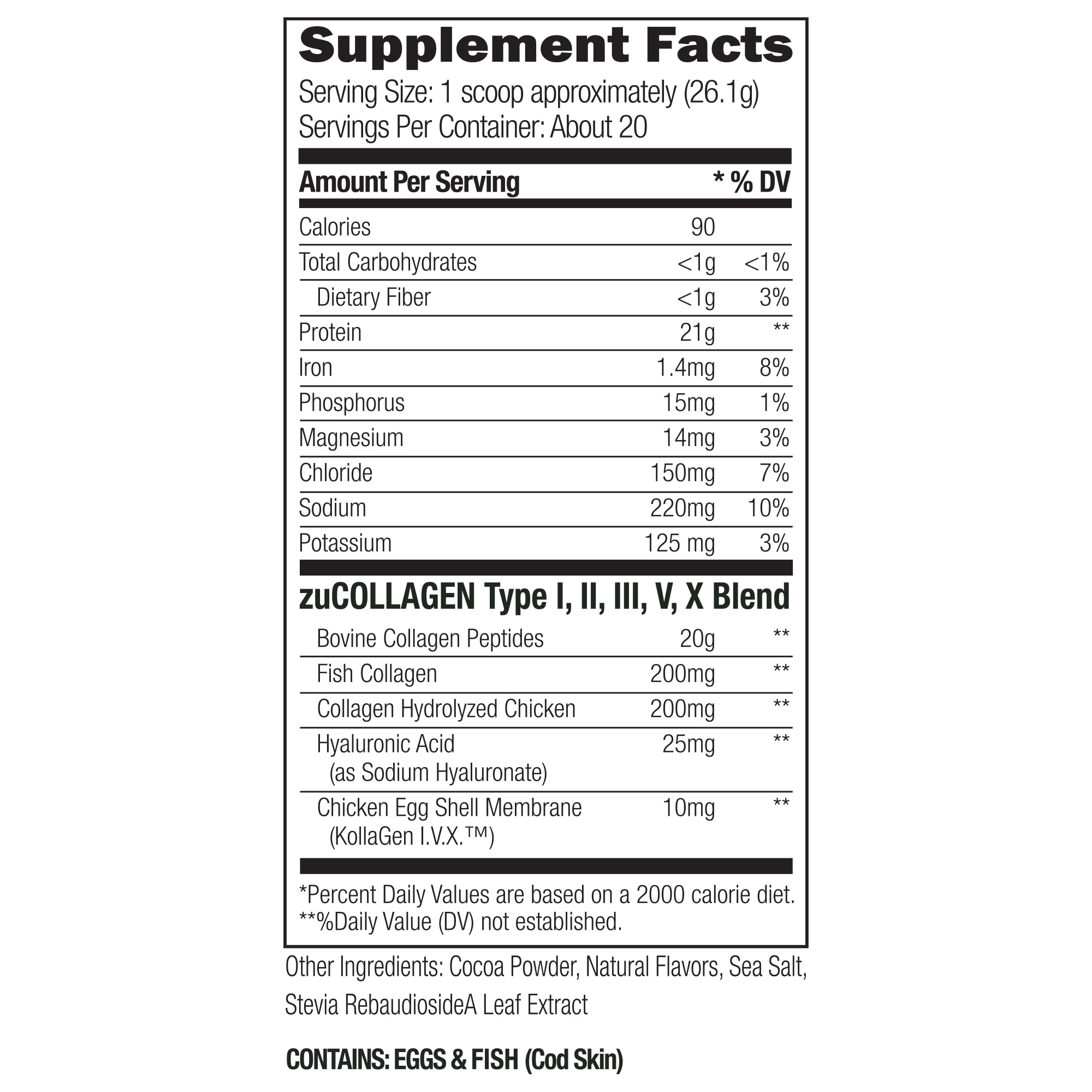"One of my favorite supplements in my daily regimen. It's delicious, filling, macro-nutrient friendly, fits any diet. It is an ideal breakfast staple after a workout along with the umzu collagen in a protein shake. Both are easily digestible and are helpful in hitting my daily protein intake. I have tried countless other brands but have been loyal to Umzu as soon as I found them."
Nick
Verified Buyer - Results may vary by individual.
zuCOLLAGEN ProteinMulti-Type Collagen
$NaN
Collagen is the most abundant protein in your body. Lack of collagen can lead to the biological effects of aging - muscle loss, poor joints, wrinkled skin, thinning hair and more.
zuCOLLAGEN Protein is more than just collagen protein - it's actually a unique and powerful hydrolyzed natural blend of 5 different collagen types that support your skin's elasticity and glow, helps your circulatory system, your gut, joints and cartilage.†
zuCOLLAGEN Protein is available in two flavors - Unflavored and Chocolate Brownie: - Unflavored contains 20g of protein at just 80 calories. Chocolate Brownie contains 21g of protein at just 90 calories.
Skin Elasticity & Hydration
Hair & Nails
Joints & Bones
Flavor
Subscription
Quantity
Free USA Shipping On Orders $75+
60-Day Money Back Guarantee
Featured Add-Ons:
Collagen is the most abundant protein in your body. Lack of collagen can lead to the biological effects of aging - muscle loss, poor joints, wrinkled skin, thinning hair and more.
zuCOLLAGEN Protein is more than just collagen protein - it's actually a unique and powerful hydrolyzed natural blend of 5 different collagen types that support your skin's elasticity and glow, helps your circulatory system, your gut, joints and cartilage.†
zuCOLLAGEN Protein is available in two flavors - Unflavored and Chocolate Brownie: - Unflavored contains 20g of protein at just 80 calories. Chocolate Brownie contains 21g of protein at just 90 calories.
Skin Elasticity & Hydration
Hair & Nails
Joints & Bones
Flavor
Subscription
Quantity
Free USA Shipping On Orders $75+
60-Day Money Back Guarantee
"One of my favorite supplements in my daily regimen. It's delicious, filling, macro-nutrient friendly, fits any diet. It is an ideal breakfast staple after a workout along with the umzu collagen in a protein shake. Both are easily digestible and are helpful in hitting my daily protein intake. I have tried countless other brands but have been loyal to Umzu as soon as I found them."
Nick
Verified Buyer - Results may vary by individual.
Collagen is the most abundant protein in your body. Lack of collagen can lead to the biological effects of aging - muscle loss, poor joints, wrinkled skin, thinning hair and more.
zuCOLLAGEN Protein is more than just collagen protein - it's actually a unique and powerful hydrolyzed natural blend of 5 different collagen types that support your skin's elasticity and glow, helps your circulatory system, your gut, joints and cartilage.†
zuCOLLAGEN Protein is available in two flavors - Unflavored and Chocolate Brownie: - Unflavored contains 20g of protein at just 80 calories. Chocolate Brownie contains 21g of protein at just 90 calories.
Skin Elasticity & Hydration
Hair & Nails
Joints & Bones
More than just protein. Support skin, hair, nails & joints with zuCOLLAGEN.
PROTEIN : CALORIE RATIO
With more protein for fewer calories, zuCOLLAGEN packs in 20g of protein at just 80 calories (Unflavored) & 21g of protein at just 90 calories (Chocolate Brownie). Beat that!
Skin, Hair & Nail Health
Collagen plays a critical role in the well-being and maintenance of our hair, skin, & nails. zuCOLLAGEN helps to support healthy skin elasticity, thick hair, & strong nails.†
Joint Support
zuCOLLAGEN is a unique hydrolyzed natural blend of 5 collagen types that support your skin's elasticity & glow, helps your circulatory system, gut, joints, muscles & cartilage!†
5 collagen types. 4 hydrolyzed sources. 1 convenient scoop.
zuCOLLAGEN is a blend of 5 different collagen types - Types I, II, III, V and X. Each type comes with its own unique benefits, so why settle for just one?
- 1 Scoop Daily
- Satisfy Your Sweet Tooth With Chocolate Brownie
- Taste Nothing With Unflavored
- 5 Collagen Types
- 20-21g of Protein for 80-90 Calories
- Skin, Hair & Nail Health
By supplementing with all 5 types of collagen you may get the benefit of maintaining healthy muscle mass and bone density while promoting healthy aging. You may also enjoy healthy, glowing, and elastic skin, thicker hair, and strong joints, tissue, and cartilage while you support the overall health of your gut and heart.†
-
1 Scoop Daily. When drinking zuCOLLAGEN in only water, mix with hot water for a better blend. For a perfect blend, try using a frother when mixing.
-
Satisfy Your Sweet Tooth. Mix the zuCOLLAGEN Chocolate Brownie flavor with hot water for a healthy hot chocolate, or mix into a smoothie for an added sweetness.
-
Or Taste Nothing. With our zuCOLLAGEN Unflavored option, add 20g of protein to any hot drink, smoothie or meal with no added taste.
Nature does the work. Ingredients in zuCOLLAGEN:


It's All About the Amino Acids.
Natural products you can trust
No Harmful Fillers
Thermo-Approved
Natural Ingredients
cGMP Manufactured
Research-Backed
Assembled in the USA
Lab Tested
Any questions we haven't answered? We're here to help.
Frequently asked questions about zuCOLLAGEN and important things to consider when using the product.


















